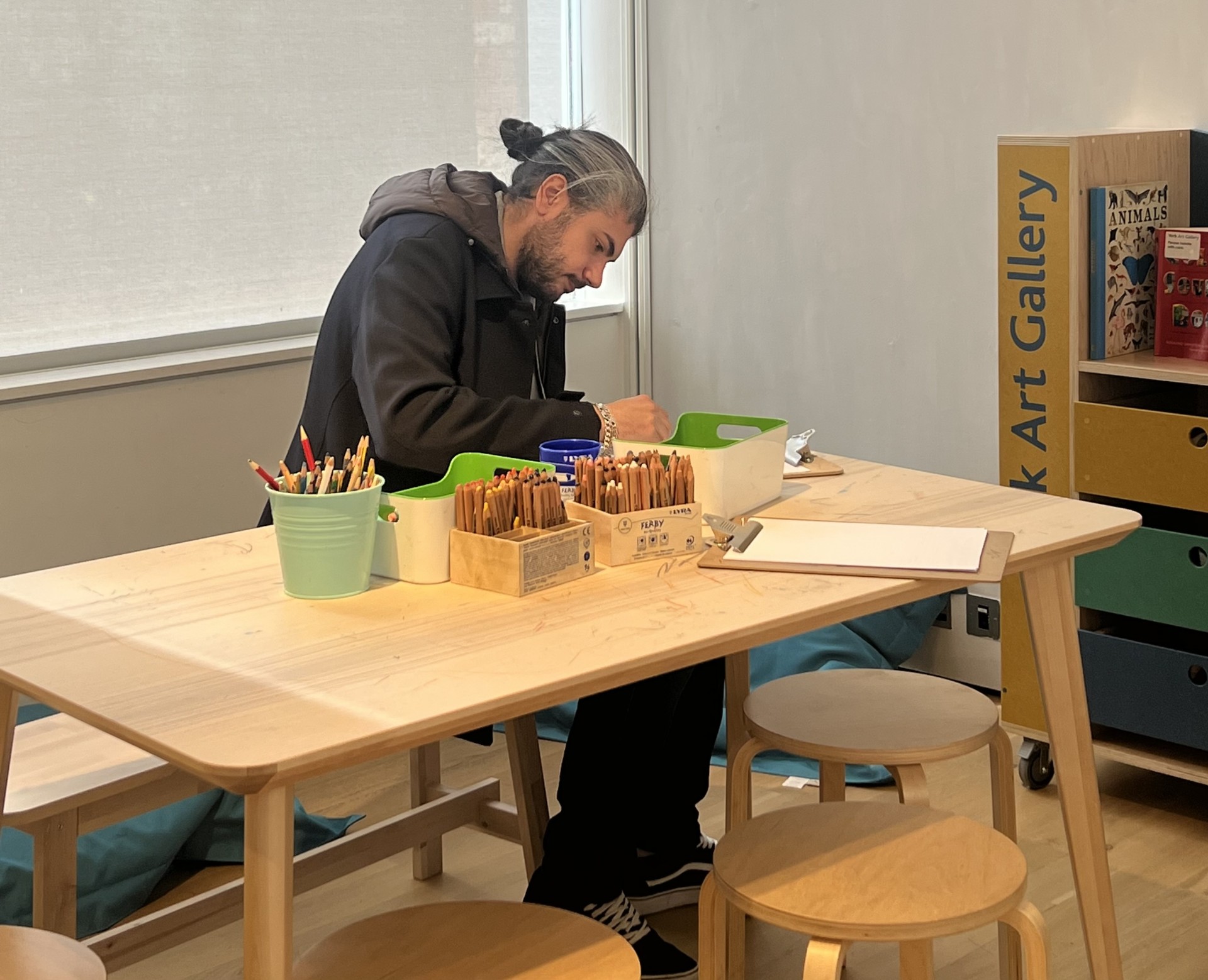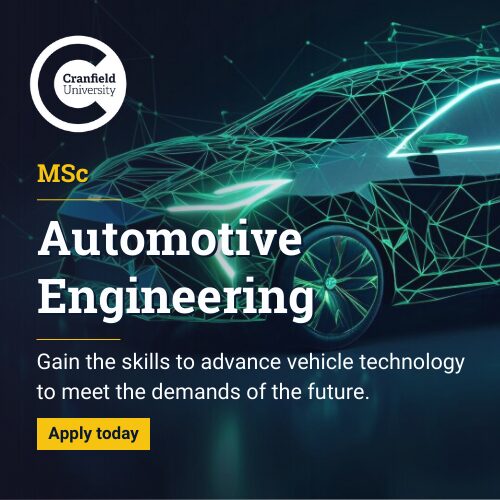Automotive Engineering MSc alumnus Ghazi Raad on the impact of Cranfield on his career
06/02/2025

Ghazi Raad is a Senior Innovation Engineer at AQA. He graduated from Cranfield University with an MSc in Automotive Engineering in 2023, after also completing a Pre-master’s in engineering in 2022. Here, Ghazi talks about how his time at Cranfield has been instrumental in shaping his career in advanced engineering, particularly in digital twins, new technology and automation. Currently, he is applying for a Global Talent visa, which recognises leaders or potential leaders in digital technology, and would afford him the opportunity to live and work in the UK for five years.
Reflecting on two years at Cranfield
My two years at Cranfield, completing a Pre-master’s in Engineering, followed by an MSc in Automotive Engineering, provided me with the comprehensive skills needed to excel in today’s dynamic engineering landscape. The pre-master’s course provided me with a foundational “bridge” between my undergraduate experience and the more specialised MSc coursework. It strengthened my research skills and introduced me to advanced topics early, which made transitioning into the MSc smoother. This additional time also helped me build confidence in a new academic environment.
The integrated programme allowed me to delve into both aerospace and automotive engineering, fostering a versatile skill set. Engaging in projects that combined mechanical engineering with software development and data analysis, I developed digital twin models—virtual replicas of physical systems enhanced with real-time sensor data and predictive insights. These projects not only deepened my technical expertise but also encouraged collaboration with peers from diverse engineering backgrounds, enhancing my ability to tackle complex, interdisciplinary challenges.
One of the biggest highlights of my MSc was the hands-on collaboration in labs and group projects, which fostered real problem-solving skills. I also appreciated the chance to work closely with faculty who are leaders in their fields. Their mentorship, combined with Cranfield’s industry-focused approach, shaped a strong technical and professional perspective. The cohort was very supportive and encouraged research and discovery. I even got to work with Cornell University for my thesis!
Addressing real-word engineering challenges
Upon graduation, I leveraged the multifaceted skills honed at Cranfield to address real-world engineering challenges. I’m currently working as a Senior Innovation Engineer at AQA, where I integrate automation and digital technologies into large-scale educational assessment processes. This role perfectly aligns with the multidisciplinary training I received, allowing me to integrate mechanical design, advanced simulations, and data-driven decision-making.
My day often includes cross-departmental meetings, coding or testing new solutions, and ensuring project milestones align with strategic goals. Outside of work, I’m actively volunteering to organise and give talks for children and the next generation about career guidance, tech usage, and the ethical usage of AI.
Applying for the Global Talent visa
Driven by a desire to expand my impact globally, I am currently applying for the Global Talent visa. This visa recognises individuals with exceptional talent in digital technology and other fields, allowing them to live and work in the UK to drive innovation. Cranfield’s rigorous curriculum and emphasis on real-world applications have been instrumental in preparing me for this opportunity, providing a solid foundation to demonstrate my expertise and potential impact.
The Global Talent visa offers numerous benefits, including access to a broader network of industry leaders, opportunities to collaborate on high-impact projects, and the ability to contribute to the UK’s vibrant technology sector. By pursuing this visa, I aim to leverage my Cranfield education and professional experiences to foster innovation in digital twin technologies and automation, supporting the development of smarter, more efficient systems that benefit both businesses and society.
My application is progressing well. I’m currently collecting the final set of endorsement letters and supporting documents. It’s been an exciting experience reflecting on my academic and professional background, and I hope to finalise everything in the coming weeks and month. It has been a journey where I restructure my perspective into a thought leader.
 Lessons from an engineer
Lessons from an engineer
A crucial lesson I’ve embraced is that failure is not the end—it’s a teacher. Throughout my journey, whether refining digital twins or overcoming integration challenges, the philosophy of failing fast and moving forward has been essential. Each setback became an opportunity to refine my approach, enhance my problem-solving skills, and drive innovation with greater determination. This resilience, fostered at Cranfield, has been instrumental in my professional growth and ability to lead impactful projects.
I’m passionate about sharing knowledge—whether through mentoring junior colleagues or volunteering in community tech workshops. For me, innovation means staying curious and giving back to help others grow. My advice is that whether you’re a student deciding on your path or a professional eager to explore advanced engineering, stay curious about fields beyond your usual comfort zone. Collaborate with experts in different areas, embrace new tools, and don’t hesitate to test out fresh ideas—even if they involve bridging mechanical constraints with advanced data analytics or parametric design.
I’m energised by the ongoing transformations in digital twin deployments and believe we’re only scratching the surface of what’s possible. As I move forward—whether developing new simulation-based solutions or integrating large-scale automated workflows—I carry with me the Cranfield spirit of blending grounded knowledge with inventive, systems-level thinking. This approach not only drives my professional endeavours but also reinforces my commitment to fostering innovation that is both impactful and ethically sound.
Categories & Tags:
Leave a comment on this post:
You might also like…
From classroom to cockpit: What’s next after Cranfield
The Air Transport Management MSc isn’t just about learning theory — it’s about preparing for a career in the aviation industry. Adit shares his dream job, insights from classmates, and advice for prospective students. ...
Setting up a shared group folder in a reference manager
Many of our students are now busy working on their group projects. One easy way to share references amongst a group is to set up group folders in a reference manager like Mendeley or Zotero. ...
Company codes – CUSIP, SEDOL, ISIN…. What do they mean and how can you use them in our Library resources?
As you use our many finance resources, you will probably notice unique company identifiers which may be codes or symbols. It is worth spending some time getting to know what these are and which resources ...
Supporting careers in defence through specialist education
As a materials engineer by background, I have always been drawn to fields where technical expertise directly shapes real‑world outcomes. Few sectors exemplify this better than defence. Engineering careers in defence sit at the ...
What being a woman in STEM means to me
STEM is both a way of thinking and a practical toolkit. It sharpens reasoning and equips us to turn ideas into solutions with measurable impact. For me, STEM has never been only about acquiring ...
A woman’s experience in environmental science within defence
When I stepped into the gates of the Defence Academy it was the 30th September 2019. I did not know at the time that this would be the beginning of a long journey as ...








